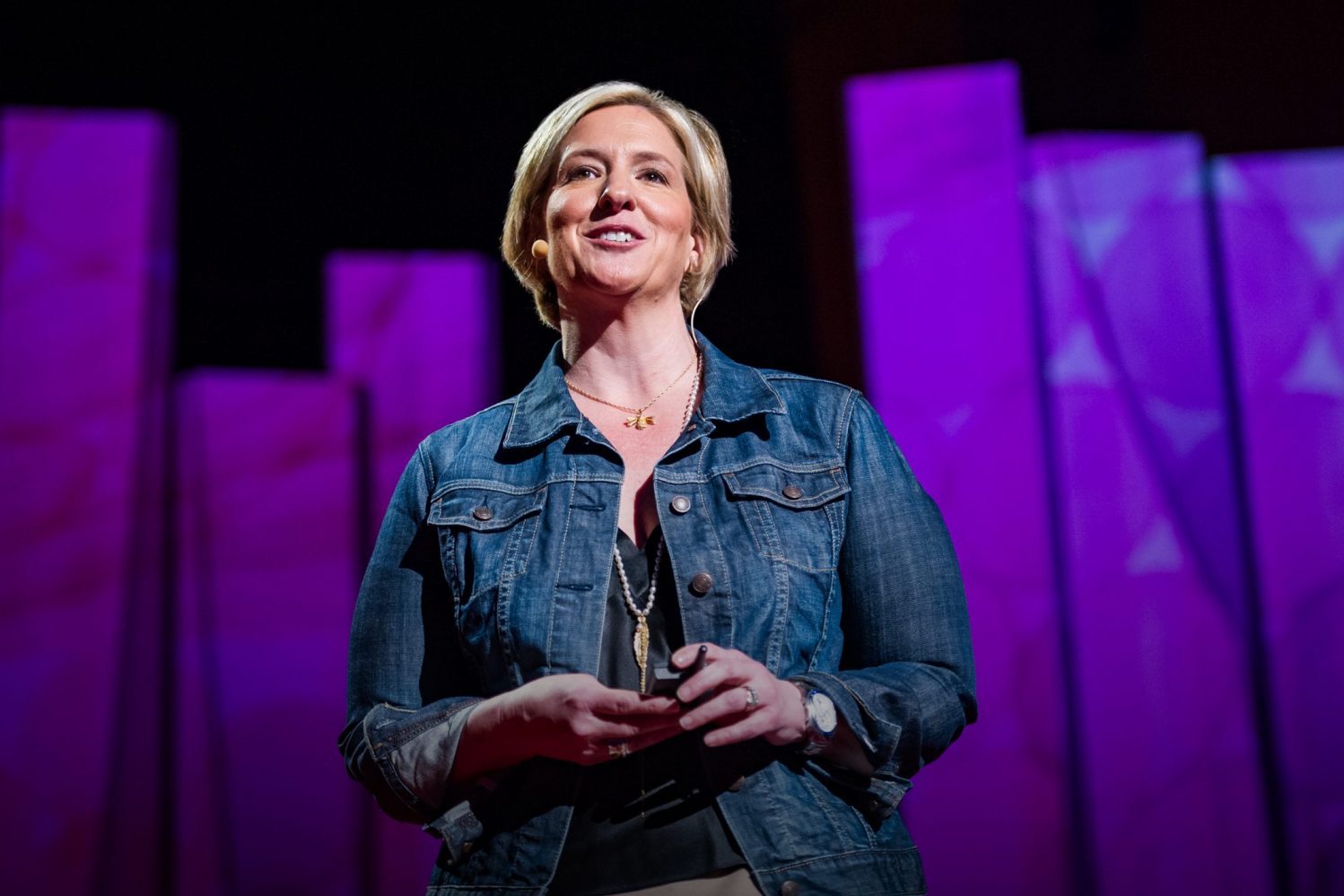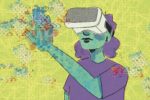At the age of 54, Dr. Brené Brown, a social work research professor at the University of Houston, has collected thousands of pieces of data. She has written seven books — five of which became New York Times bestsellers — and has been the star of her own Netflix special. She has achieved every middle-aged woman’s dream of chatting with Oprah Winfrey, and most recently, realized her own lifelong dream of starting a podcast titled “Unlocking Us” in March of this year.
But when it comes to vulnerability, she struggles.
Brown, a Texas Longhorns fanatic and a mother of two, resembles many of us who have difficulty stripping away armor self-constructed in an attempt to prevent emotional exposure. But unlike many of us, she researches vulnerability for a living. That’s right, the setback in her personal life also happens to be the focus of her professional life.
Brown discussed her views about vulnerability on the first episode of “Unlocking Us,” which she defines as risk, uncertainty and emotional exposure. Through “Unlocking Us,” Brown aims to have conversations with writers, activists and artists to unravel what it means to be human as well as touch upon the truths she has learned through her own social work research.
“I believe in vulnerability, I try to practice it, [but] I am not really into it,” Brown said. “I’m the researcher [of vulnerability], not the representative.”
If you know nothing about Brown’s lifelong work and her forthright disposition, these words coming from a so-called “vulnerability researcher” may sound like a confession slicing through open air. But Brown has spoken transparently about her natural distaste toward vulnerability since the start.
In 2010, Brown gave a TED Talk at the University of Houston called “The Power of Vulnerability.” She spoke about her pursuit of social work and research as a means to avoid vulnerability; to use data as a way to clean up life’s messiness, a philosophy that collapsed while she carried out her doctoral research on human connection. Brown’s data deceived her, clearly indicating humans can’t have connections without vulnerability. After interviewing hundreds of people, Brown found those who have the courage to embrace imperfection, have compassion for themselves and live authentically, feel a worthiness for connection that others don’t.
Standing alone on a stage in front of hundreds of people, Brown admitted the personal aftermath of her findings: a mental breakdown — which she also coins a spiritual awakening — that changed the way she approaches parenting, teaching, loving and living.
The TED Talk went viral, not only making her seen and heard by the hundreds of people in a Houston auditorium in 2010, but by over 60 million people and counting, all over the world and across multiple internet platforms, even now, ten years later.
20 vulnerable minutes changed the course of Brown’s life. Since then, she has become a renowned speaker, taking stages all over the country to discuss the importance of embracing vulnerability and minimizing shame, often using anecdotes from her own life to help viewers see how the research can be applied to their own. However, through “Unlocking Us,” Brown has recently begun to occupy a smaller space and is reaching her audience in a more intimate way by vocalizing her stories and findings through a microphone set up in her own house.
In the first episode of “Unlocking Us,” Brown discusses the awkwardness of starting something new, introducing listeners to the term “F.F.T.,” or “F***ing First Times.” While beginning a new project or job may feel stressful, Brown says it constitutes a vital part of the human experience.
https://open.spotify.com/episode/3dfDCFtzwJKIPGW7yajfuC?si=MZYSJxbHTBaou3CfIOb-zQ
“When we give up being new and awkward, we stop growing, and when we stop growing, we stop living,” Brown said.
Brown goes on to discuss the three ways listeners can mitigate a dreadful F.F.T., but not before explaining how they have shown up in her own life, and all the ways — both cleverly and foolishly — she handled them. Brown reveals embarrassing but inconsequential occurrences, like not knowing how to unclip her biking shoes from a Peloton, but also confides to listeners about more significant behind-the-scenes secrets, like the stress of launching a new podcast during the rise of a global pandemic.
Brown releases episodes like these where she talks directly to the audience every now and then, but “Unlocking Us” mostly consists of interviews she conducts with guests. She does her homework, no doubt, pulling out her favorite quotes from guests’ books and asking them questions about their beliefs and viewpoints. She tactfully looks at their lives through the lens of someone who has not only studied their autobiography, but the autobiography of the human race, making the conversations like the ones on “Unlocking Us” difficult to come by anywhere else.
Even in interviews, Brown uses her own experiences and knowledge to make the conversation flow seamlessly down a two-way street. Back in April, she spoke with the 19th Surgeon General of the United States, Dr. Vivek Murthy, on the topic of loneliness. In their discussion, Brown talked about her own experiences with connection as a segue into the multiple dimensions of loneliness Murthy writes about in his book.
“I believe we all have experiences of loneliness,” Brown said. “When I think back on my life and the bouts of loneliness I’ve had, I have never been more lonely in my life than when I was surrounded by people I knew and loved, and some of the most fulfilling connected times I’ve had, I’ve been alone.”
Murthy then opened up about his own history with loneliness, explaining to Brown that many people experience the same thing she has. Hearing Murthy, a man appointed as a spokesperson for the United States government, speaks about how heavily it hit when he ate lunch alone in high school.
Regardless of Brown’s choice of topic or guest, one thing on “Unlocking Us” holds true: she speaks openly and honestly, using podcasting as a platform to equate herself to the audience. Brown, who has probably done more research about the complexity of the human experience than most of us ever will, emits her message, not as a stuffy professor, but as one of us — someone who struggled with vulnerability and shame and questioned her own self-worth and belonging.
In fact, between her highly expressed love for the state of Texas and sprinkled use of profane language, Brown seems less like a researcher and more like the cool mom next door; the kind who spreads real butter on her kids’ toast instead of that fake healthy stuff. I didn’t grow up in Brown’s household, so I can’t tell you if these things are true, but when she’s talking through a microphone and discussing vulnerability with a batch of eager listeners — one of them being myself — it makes no difference. She may as well be just that. And I still listen.


















This post really resonates with me. It’s so comforting to be reminded that loneliness is a shared experience, not something we have to face alone. Thank you for shedding light on this important topic!
Thank you for this heartfelt post! It’s comforting to know that we’re not alone in our struggles with loneliness. Your insights really resonated with me, and it’s a reminder that vulnerability can foster connection. Looking forward to more of your thoughts on this topic!
This post really resonated with me. It’s comforting to know that we’re all dealing with loneliness in some form, and it’s okay to talk about it. Thank you for shedding light on this topic!
This post really resonates with me! It’s comforting to know that loneliness is something we all experience at times. Thank you for shedding light on such an important topic and reminding us that we’re not alone in our struggles.
This post really resonates with me. It’s so important to acknowledge that loneliness is a shared experience, yet so many of us feel isolated in our struggles. Thank you for shedding light on this topic and reminding us that we’re not alone in feeling this way.